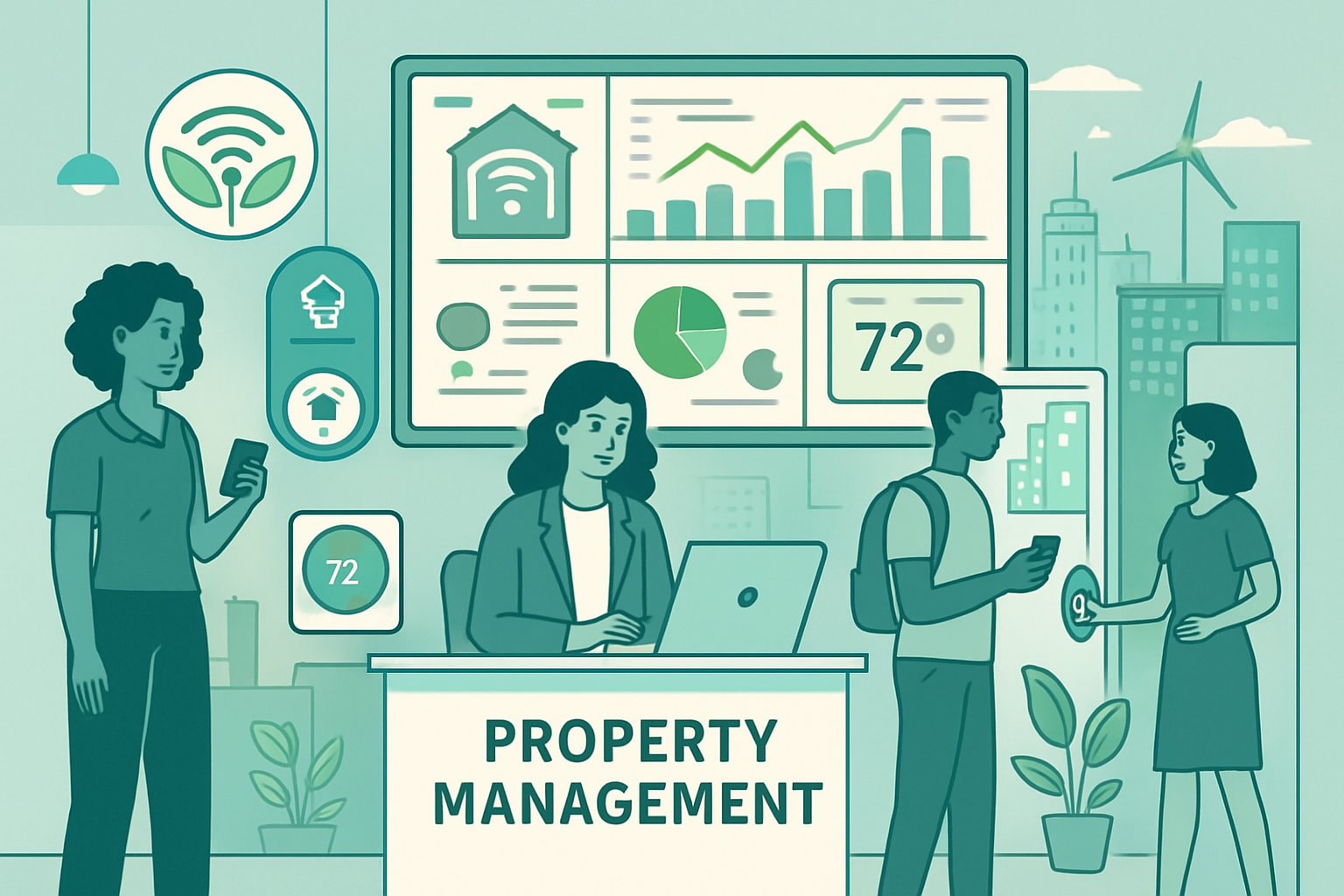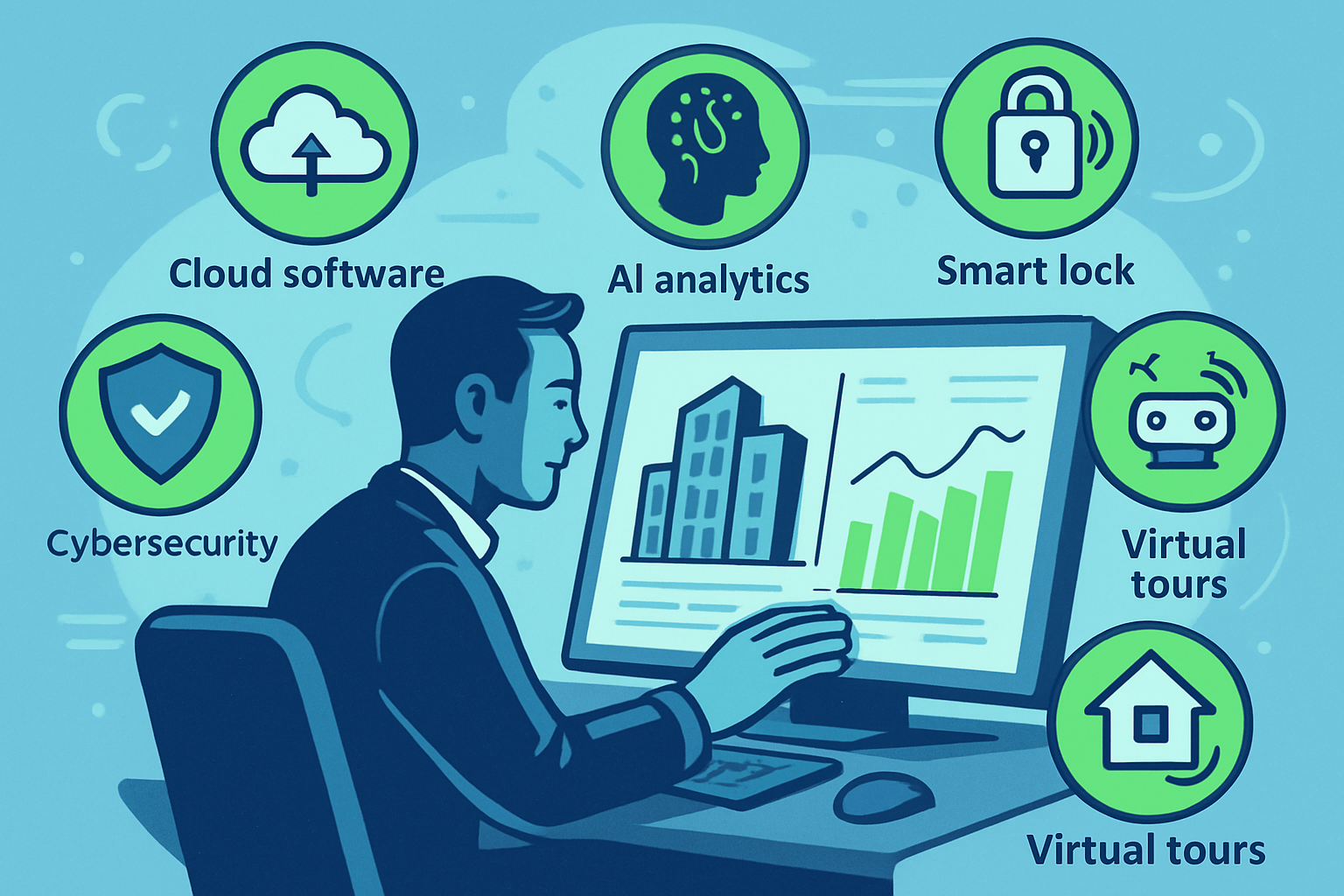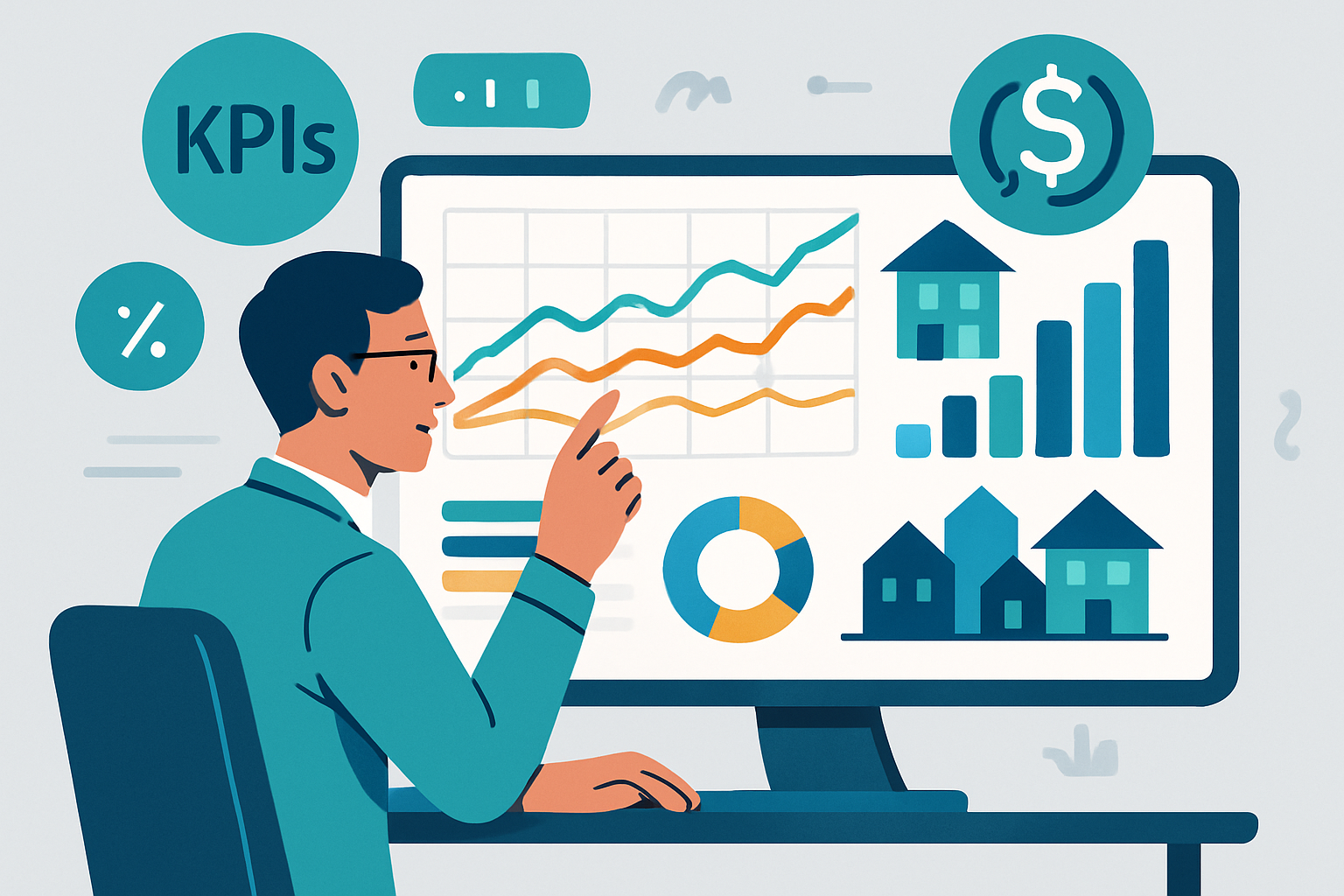The world of advanced property management is changing fast. Every year, new technologies and rising expectations make the industry more complex and competitive.
To succeed in 2025, property managers must move beyond basics. This guide equips you with actionable strategies and advanced insights to boost efficiency, profitability, and tenant satisfaction.
Ready to lead? Explore the latest trends in technology, regulation, tenant demands, sustainability, and portfolio growth—and stay ahead of the curve.
The Evolving Landscape of Property Management in 2025
The landscape of advanced property management is undergoing rapid transformation as we approach 2025. Modern property managers face new complexities, driven by technological innovation, regulatory shifts, and evolving tenant demands. Understanding these changes is crucial for anyone committed to advanced property management success.

Key Industry Trends and Market Shifts
The advanced property management sector is seeing significant shifts in 2025. Remote work continues to influence rental demand, with more tenants seeking flexible lease terms and co-living options. Institutional investors are increasing their presence in both residential and commercial spaces, raising competition. The short-term and vacation rental markets are expanding, reflecting changing lifestyles. For example, 2024 reported a 15% global rise in flexible lease agreements. Managers must keep pace with these 2025 Property Management Industry Trends to stay competitive. Adapting to these shifts is essential for long-term advanced property management growth.
Regulatory and Legal Developments
Stricter regulations are shaping advanced property management practices worldwide. Enhanced tenant rights, more rigorous compliance requirements, and evolving data privacy laws are at the forefront. Countries like New Zealand have introduced Healthy Homes Standards, and similar changes are being adopted globally. Property managers must monitor legal updates closely to avoid penalties. Adopting advanced property management systems can streamline compliance tracking and documentation. Staying ahead of these developments is critical for a resilient business. Failing to adapt can result in costly legal repercussions and diminished reputation, making proactive compliance a top priority.
Changing Tenant Expectations and Demographics
Tenant expectations are transforming advanced property management in 2025. Gen Z and Millennial renters now dominate the market, demanding digital communication, mobile rent payments, and self-service portals. Amenities focused on sustainability and wellness are increasingly important. An industry survey from 2023 found that 62% of tenants prefer paying rent via mobile apps. Meeting these evolving needs ensures higher satisfaction and retention rates. Property managers who prioritize digital convenience and sustainable features position themselves as leaders in advanced property management, building loyalty among tech-savvy residents and appealing to a broader demographic.
Economic and Market Pressures
Economic volatility poses ongoing challenges for advanced property management professionals. Inflation and rising maintenance costs are squeezing margins, while rental yields and property values fluctuate unpredictably. New market entrants add further competition. Despite steady management fees, operational costs increased by 8% in 2024, highlighting the need for efficiency. Proactive cost control, value-added services, and innovative solutions are vital for maintaining profitability. Advanced property management teams that anticipate market changes and adapt quickly will be best positioned to weather uncertainty and deliver consistent value to both owners and tenants.
The Role of Sustainability and ESG
Sustainability and ESG are becoming differentiators in advanced property management. Tenants increasingly seek energy-efficient, eco-friendly homes, and governments are offering incentives for sustainable property upgrades. Properties with green certifications achieved 10% higher occupancy rates in 2024, underscoring the business value of ESG. Managers must integrate sustainable practices into operations to enhance appeal and meet regulatory demands. Prioritizing ESG demonstrates a commitment to responsible management, attracts environmentally conscious renters, and ensures compliance. Incorporating these principles is no longer optional for advanced property management firms aiming for long-term success.
Leveraging Advanced Technology for Superior Management
Innovation is reshaping the advanced property management industry, driving efficiency, profitability, and tenant satisfaction to new heights. To stay ahead in 2025, property managers must embrace digital transformation across every aspect of operations.

Property Management Software and Automation
Modern property management software is the backbone of advanced property management. Cloud-based, integrated platforms streamline operations by automating rent collection, maintenance requests, and communications.
Key benefits include:
- Centralized data management
- Automated reminders for tenants and staff
- Real-time financial tracking
For example, automated systems reduced late payments by 25% in 2024. Leveraging these tools is essential for operational efficiency and scalability. To explore what these solutions can offer, see this Property management services overview.
Artificial Intelligence and Predictive Analytics
Artificial intelligence is revolutionizing advanced property management through smarter decision-making. AI-driven tenant screening and risk assessment tools reduce manual errors and help identify quality tenants faster.
Predictive analytics enable property managers to:
- Anticipate maintenance needs
- Optimize rent pricing
- Reduce vacancy periods
Pilot programs in 2024 showed AI tools cut tenant turnover by 18%. By relying on data, advanced property management professionals achieve better outcomes and minimize risk.
Smart Home and IoT Integration
Smart home technology is now a core expectation in advanced property management. Devices like smart locks, thermostats, and security cameras enhance tenant experience and provide peace of mind.
IoT sensors allow for:
- Proactive property maintenance alerts
- Monitoring energy usage
- Early detection of leaks or hazards
In 2024, IoT devices reduced emergency repair calls by 30%. Integrating smart technology demonstrates a commitment to innovation in advanced property management.
Virtual Tours, Digital Leasing, and Remote Management
The rise of virtual tools is transforming advanced property management, making it easier to attract and retain tenants. 3D virtual tours and online leasing streamline the application process and widen your market reach.
Key features include:
- Digital lease signing
- Remote property inspections
- Secure document storage
Virtual tours increased applicant conversion rates by 20% in 2024. Remote management capabilities are now essential for scalability in advanced property management.
Cybersecurity and Data Protection
With digital transformation comes increased cybersecurity risk. Protecting tenant and owner data is non-negotiable for advanced property management.
Best practices involve:
- Multi-factor authentication
- Regular software updates
- Staff cybersecurity training
Real estate firms saw a 40% rise in cyberattacks in 2024. Safeguarding information is a core responsibility in advanced property management.
Evaluating and Adopting New Technologies
Continuous improvement is the hallmark of advanced property management. Evaluate new technologies based on ROI, scalability, and staff readiness.
Effective strategies include:
- Training staff to maximize benefits
- Regularly reviewing tech performance
- Staying updated with industry trends
Managers who invested in staff tech training achieved 15% higher operational efficiency. Ongoing learning ensures your advanced property management approach remains future-proof.
Data-Driven Decision Making and Portfolio Optimization
In the era of advanced property management, data is the new competitive edge. Leaders in 2025 must harness analytics to drive operational efficiency, maximize returns, and future-proof their portfolios. Let’s break down the essential strategies for mastering data-driven decision making and optimizing every aspect of your property holdings.

Collecting and Analyzing Key Performance Metrics
Success in advanced property management starts with robust performance tracking. Key performance indicators (KPIs) like occupancy rates, rent arrears, maintenance response times, and tenant retention are crucial.
A well-designed dashboard delivers real-time insights, empowering you to address issues before they escalate. For example, firms using real-time KPI tracking improved net operating income by 12%.
| KPI | Target Value |
|---|---|
| Occupancy Rate | 95%+ |
| Maintenance Response Time | <24 hours |
| Tenant Retention | 80%+ |
| Rent Arrears | <3% |
By prioritizing these metrics, advanced property management professionals make smarter, faster decisions that directly impact profitability.
Dynamic Pricing and Revenue Management
In advanced property management, static pricing is a thing of the past. Dynamic pricing tools analyze current market data to recommend optimal rent rates, responding instantly to shifts in demand.
Adopting revenue management software lets you maximize income even in volatile conditions. For instance, dynamic pricing strategies increased rental income by up to 8% in competitive markets.
- Real-time market comparison
- Automated rent adjustments
- Optimized lease renewals
Responsive pricing through advanced property management ensures your assets remain competitive and profitable, regardless of market fluctuations.
Asset Lifecycle and Maintenance Planning
Asset longevity is a cornerstone of advanced property management. Predictive maintenance uses data from property systems to schedule repairs before issues arise, reducing costs and minimizing downtime.
Instead of reactive fixes, lifecycle analysis helps budget for upgrades and capital improvements. Predictive maintenance programs have cut annual repair costs by 20%, preserving both asset value and tenant satisfaction.
- Scheduled inspections
- Maintenance forecasting
- Capital improvement planning
Data-driven maintenance strategies ensure your properties remain attractive, functional, and cost-effective.
Portfolio Diversification and Risk Mitigation
Advanced property management goes beyond single-property focus. Analyzing market trends and risk factors supports effective portfolio diversification, reducing exposure to market downturns.
Risk assessment models guide acquisition and disposition decisions. In 2024, diversified portfolios experienced 30% lower vacancy rates in volatile markets.
- Market trend analysis
- Scenario-based risk modeling
- Geographic and asset-type diversification
Strategic diversification within advanced property management enhances resilience and positions your portfolio for long-term growth.
Enhancing Owner and Stakeholder Reporting
Transparent, data-rich reporting is vital in advanced property management. Automated systems generate customizable reports, offering owners detailed insights into performance, expenses, and asset health.
Enhanced reporting has led to a 25% increase in owner satisfaction scores. For practical tools and resources, explore Owner resources and reporting to further streamline your stakeholder communications.
Clear, timely communication through advanced property management not only builds trust but also strengthens retention and reputation.
Building Exceptional Tenant Experiences
Delivering outstanding tenant experiences is now a cornerstone of advanced property management. The evolving rental landscape demands a proactive, tenant-centric approach. Modern renters expect more than just a place to live—they seek convenience, community, and responsive service. Meeting these expectations is essential for long-term success and portfolio growth.

Responsive Communication and Service
In advanced property management, seamless communication is non-negotiable. Tenants expect 24/7 access to support through digital channels such as chat, email, and mobile apps. Quick responses to maintenance requests and inquiries build trust and satisfaction.
- 24/7 digital support lines
- Automated maintenance tracking
- Real-time updates on service status
For example, properties implementing 24-hour response policies experienced a 15% uptick in lease renewals. Responsive service is a direct driver of tenant loyalty and retention, setting advanced property management teams apart from competitors.
Personalization and Community Building
Personalized experiences are redefining tenant satisfaction in advanced property management. Tailoring amenities, services, and communications to individual preferences demonstrates attention to detail.
- Customizable amenity packages
- Resident interest groups and clubs
- Community events and gatherings
A recent survey found that community-building initiatives, such as social events and fitness classes, led to a 12% increase in tenant satisfaction scores. Table: Tenant Experience Drivers
| Driver | Impact on Retention |
|---|---|
| Personalized events | High |
| Tailored amenities | Moderate |
| Digital engagement | High |
Intentional community engagement fosters a sense of belonging, making tenants more likely to renew.
Streamlined Onboarding and Move-In Processes
First impressions matter. Advanced property management teams streamline onboarding by digitizing leases and automating move-in checklists. Digital welcome packages and orientation materials reduce confusion and ensure a smooth transition.
- E-signature lease agreements
- Automated key handoff instructions
- Virtual property orientation tours
A streamlined onboarding process reduced move-in issues by 30%. These improvements not only enhance tenant satisfaction but also free up staff time for higher-level service in advanced property management.
Proactive Maintenance and Upgrades
Preventative care is a hallmark of advanced property management. Scheduled maintenance, coupled with transparent repair tracking, keeps properties in top condition and minimizes disruptions for tenants.
- Regular HVAC and plumbing checks
- Smart home system upgrades
- Real-time repair status updates
Proactive maintenance programs decreased tenant complaints by 22%. Tenants who see visible investment in property upkeep are more likely to extend their leases, underscoring the value of this approach within advanced property management.
Tenant Feedback and Continuous Improvement
Collecting and acting on tenant feedback is central to advanced property management. Regular surveys, suggestion boxes, and digital review platforms provide actionable insights.
- Quarterly satisfaction surveys
- Prompt implementation of feedback-driven changes
- Transparent communication about improvements
For example, properties that prioritized feedback-driven improvements saw online ratings rise by 18%. Staying ahead of trends, such as those outlined in Property Management Trends for 2025, ensures your tenant experience strategy remains competitive. Continuous improvement, grounded in tenant voices, is the foundation of exceptional service.
Advanced Strategies for Portfolio Growth and Profitability
In 2025, advanced property management demands a proactive, strategic approach to portfolio growth and profitability. The landscape is more competitive than ever, requiring managers to excel in acquisitions, renovations, operations, and risk mitigation. Below are proven strategies that set high-performing professionals apart.
Strategic Acquisition and Disposition
Identifying opportunities in emerging or undervalued markets is central to advanced property management. Effective managers analyze macroeconomic trends, demographic shifts, and local developments to guide acquisitions and timely dispositions. For example, early 2024 investments in secondary markets outperformed primary markets by 10%.
Successful acquisition strategies include:
- Monitoring local supply and demand
- Evaluating property types for long-term growth
- Timing sales to maximize ROI
Data-driven decisions ensure portfolios remain agile and profitable. Advanced property management teams regularly reassess their holdings, leveraging market intelligence to stay ahead.
Value-Add Renovations and Asset Repositioning
Upgrading assets to meet evolving tenant needs is a core principle of advanced property management. Value-add renovations—such as eco-friendly upgrades or smart technology installations—can deliver rent premiums of up to 15%.
Key steps include:
- Assessing which amenities drive demand
- Implementing sustainability and energy-efficient improvements
- Rebranding or repositioning assets for new demographics
By investing in strategic upgrades, managers increase both property value and tenant satisfaction. These initiatives also help properties stand out in crowded markets.
Scaling Operations with Outsourcing and Partnerships
Advanced property management often involves scaling through strategic outsourcing and partnerships. By collaborating with third-party vendors for maintenance or administration, managers can reduce overhead by 12% and focus on growth.
Consider these tactics:
- Outsourcing routine, non-core tasks
- Partnering with local businesses for value-added services
- Leveraging digital platforms for workflow management
For more insights, visit Property management specialists insights to explore proven strategies that support scalable operations. These approaches create operational flexibility and allow teams to adapt quickly.
Maximizing Occupancy and Reducing Vacancy
Consistently high occupancy is a hallmark of successful advanced property management. Multi-channel marketing and robust lead generation are essential for attracting quality tenants.
Best practices include:
- Using targeted digital campaigns
- Offering incentives for renewals and referrals
- Streamlining the application and onboarding process
In 2024, multi-channel campaigns helped reduce average vacancy periods by 20%. By prioritizing tenant retention and rapid unit turnover, managers ensure stable, predictable cash flow.
Navigating Economic Downturns and Market Volatility
Advanced property management also requires resilience in uncertain markets. Building cash reserves, adopting flexible lease structures, and conducting regular scenario planning are vital.
Effective risk management strategies:
- Stress testing portfolios for potential downturns
- Diversifying property types and locations
- Maintaining strong relationships with lenders
Properties with robust contingency plans maintained profitability during 2024 downturns and recovered 30% faster from disruptions. Preparedness and agility make portfolios future-proof.
Mastering Compliance, Risk, and Reputation Management
Navigating compliance, risk, and reputation is central to advanced property management in 2025. The landscape is increasingly complex, demanding a proactive, structured approach to safeguard assets, tenants, and your business reputation. Let’s break down the essential strategies every forward-thinking manager needs.
Staying Ahead of Regulatory Changes
Regulatory demands are rising, with new tenancy laws, stricter compliance checks, and evolving standards across jurisdictions. Advanced property management requires continuous monitoring of local, national, and international regulations. Implementing compliance management systems is no longer optional—it’s essential.
For example, automated compliance tracking systems reduced legal incidents by 18% in 2024. Staying informed about legal updates, such as understanding new tenancy laws, helps mitigate risk and avoid costly disruptions. Prioritizing compliance is the foundation for sustainable operations.
Tenant Screening and Fair Housing Practices
Robust tenant screening is a cornerstone of advanced property management. Leveraging data-driven tools ensures both risk mitigation and adherence to fair housing laws. Modern platforms assess background, credit, and rental history, flagging potential issues early.
Enhanced screening processes in 2024 reduced eviction rates by 10%. Equally important is maintaining compliance with anti-discrimination regulations, protecting both tenants and owners. Fair, thorough screening fosters trust and reduces exposure to legal challenges in the competitive property landscape.
Insurance, Liability, and Risk Transfer
Comprehensive insurance coverage is a must for advanced property management. Policies should cover property, liability, and business operations, tailored to each asset’s risk profile. Regular portfolio-wide insurance reviews often reveal opportunities for cost savings and better protection.
For instance, reviews identified 15% savings on insurance costs last year. Risk transfer strategies, such as using third-party contractors with their own coverage, further shield your business from unexpected events. Proper insurance planning ensures resilience and operational continuity.
Reputation Management and Online Presence
In the digital age, reputation can make or break advanced property management success. Monitoring and responding to online reviews is crucial, as prospective tenants and owners often judge based on digital impressions. Proactive engagement—addressing concerns and highlighting strengths—builds credibility.
Reputation management initiatives led to a 20% increase in lead inquiries in 2024. A positive online presence not only attracts quality tenants but also strengthens partnerships. Investing in your digital footprint is an investment in long-term growth and occupancy.
Crisis Response and Business Continuity Planning
Unexpected crises—natural disasters, cyberattacks, or public health emergencies—demand swift, strategic responses. Advanced property management involves developing detailed crisis protocols and testing them regularly. This ensures staff are prepared, and operations can resume quickly after disruptions.
Properties with established continuity plans recovered 30% faster from incidents last year. Business continuity planning protects assets, tenants, and your brand. In a volatile market, preparedness and agility are your best defenses against lasting damage.
